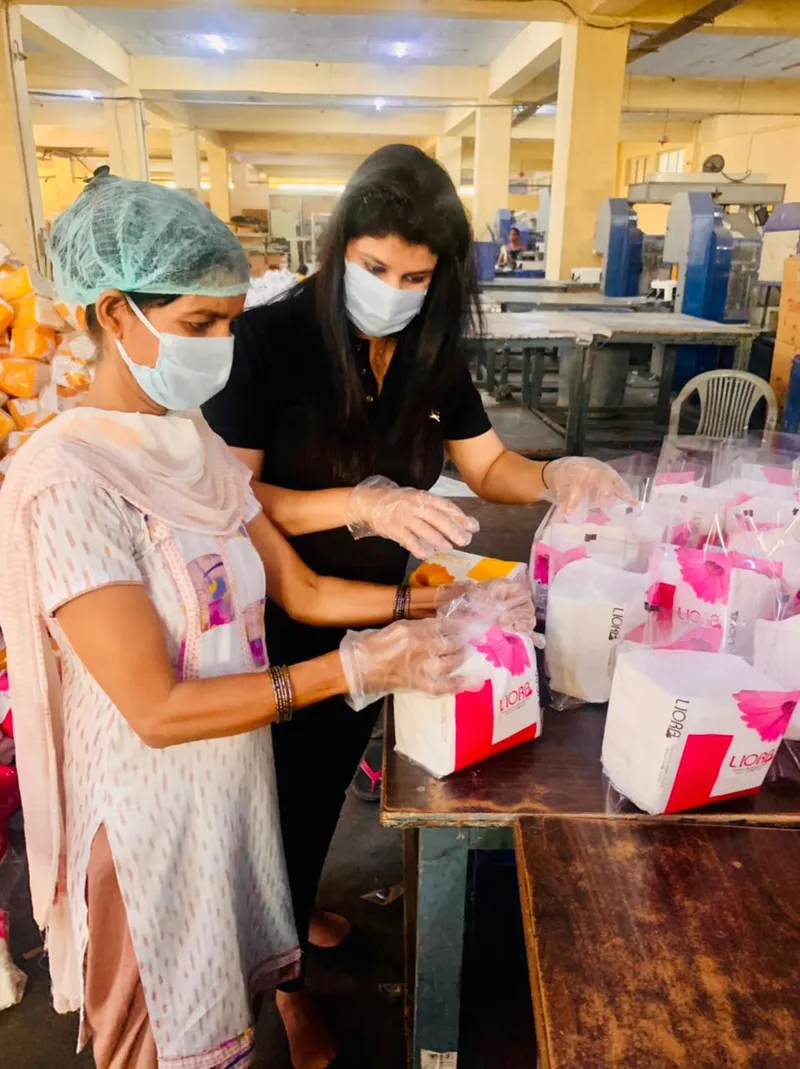How this woman entrepreneur pivoted during the pandemic and is set to achieve her pre-COVID turnover of Rs 50 Cr
Shivani Agarwal is the Founder of Scraft, which manufactures disposables like tissue paper, toilet and kitchen rolls, cling film, and aluminium foil. During the pandemic, with the help of Walmart’s Vriddhi programme, she pivoted to hand sanitisers and sanitising wipes, and started exports.
Shivani Agarwal had always dreamed of following in her father’s footsteps and establishing her own company.
After completing her undergraduate degree in economics from Delhi University and an MBA from KJ Somaiya Institute of Management, Mumbai, she worked with her father, who had a trading company for different kinds of paper, for a few years to understand the various elements of entrepreneurship.
When her father set up a manufacturing unit, the project did not take off. Shivani seized this opportunity and stepped in.
“I always wanted to work on my own, not report to anyone. I decided to use the existing resources to manufacture tissue paper, toilet and kitchen rolls and cling film and aluminium foil for food packaging, among other products,” she recalls.
Growing steadily

Shivani established Scraft Products as an MSME unit in 2010 in Sonepat, Haryana. In 11 years, though the business has seen various ups and downs, Shivani has forged ahead with ideas and processes that she did not know much about earlier, and that included association with modern and wholesale retail.
“When I started off, it was very difficult because I did not have any idea about branding, product marketing, and the like. Since a lot of investment had already gone into the plant and machinery, we did not have a lot of capital to work with, and to spend on advertising or marketing. We were talking to distributors on our own,” Shivani says.
In 2010, Walmart became Scraft’s first customer and things changed drastically.
“I met Walmart representatives during one of the trade fairs where we displayed Scraft Products. They convinced me to visit a Best Price store (now operated under Flipkart Wholesale) and see the operations ourselves. After deliberations, we started the supplies, and it was our first-ever association with a modern retail company. This has been very beneficial in terms of product development, packaging, and working in an organised and systematic way,” she adds.
In terms of operations and manufacturing, Scraft has also expanded as a private label manufacturer for MNCs and big companies. It also has various manufacturing certifications in place like SA1000 to Intertek.
As a B2C and B2B brand, Shivani says Scraft’s business is made up of small but “voluminous” orders.
Pivots that made business sense
Like most other businesses in the country, Shivani’s business struggled during the pandemic-induced lockdown.
Speaking about the challenges faced, she says, “Procurement of raw materials, work passes and licences as well as supply chain disruptions were some of the initial hurdles,” she says.
She worked on accelerating Scarft’s digitisation journey and explore online selling for business continuity and market access. Her Walmart support network stayed close to suppliers like her during the past year, and through them, Shivani was introduced to the Walmart Vriddhi program.
It made business sense for Shivani to pivot to manufacturing hand sanitisers and sanitising wipes with its own distribution network. This, she says, helped sustain the brand and also look after the 70 employees at Scraft while contributing to the bottom line of the company.
Apart from running a successful domestic business, Shivani wanted to explore taking her brand global, but she had limited knowledge on that front, as well as a lack of good leads.
Signing up for Walmart’s Vriddhi programme last year worked worked to her advantage. The virtual trainings helped her understand what she needed to do to scale her business in this domain.
“The insights that we received on marketing our products were helpful. In fact, as a result, we have started getting export orders for our products and the business is picking up. If things go as planned, we are hoping to exceed 25 percent of our pre-COVID sales from exports,” she said.
Today, Scraft exports to Africa, Europe, and the Middle East.
The Vriddhi programme has also helped Shivani gain critical business knowledge on marketing and brand-building following which she is seeing an increase in demand for her products. So far, she has managed to recover 60-70 percent of her pre-COVID sales. She is hoping to return to the Rs 50 crore turnover she had before the pandemic struck.
“The whole experience has come as a valuable learning for us. I am now looking forward to raising funds and being the leader in the disposables category. Right now, I can say I am in a good space,” Shivani says.
"Walmart Vriddhi, together with Flipkart, has been an information partner to MSMEs on topics like supply chains, sourcing, ecommerce, finance, insurance, health and safety. This has helped MSMEs build resilience and adapt to changing demand while also prioritising the well-being of their staff, families and communities. Recently, the program launched Vriddhi Cares, a curated webinar series, which also provides teleconsultation and remote counselling sessions from doctors, nurses, and other healthcare workers to MSMEs and their family members,” said Nidhi Munjal, Vice President, International Partnership Services at Walmart.
A first-time mother who gave birth to her baby during the pandemic, Shivani wants to encourage other women entrepreneurs and leaders to pursue their professional dreams and rise beyond challenges. She is now looking to hire a woman as production manager in her company and hopes to empower more women in managerial and leadership roles as her business grows.
Edited by Megha Reddy








